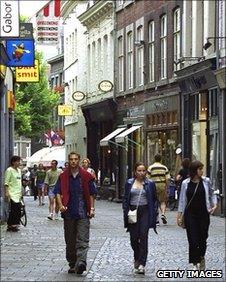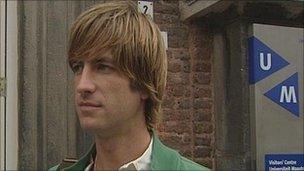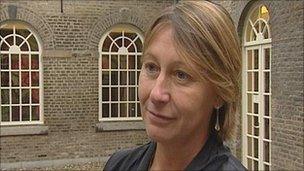UK students urged to go Dutch amid place shortage
- Published

Cobbled streets and street cafes may add to the attraction of Maastricht
With tens of thousands of would-be students likely to be turned away from UK universities this year and degree costs set to rise, higher education institutions in the Netherlands are promoting themselves as an alternative for British students.
They say there are still plenty of places left for this year and the costs of studying abroad could, for some students, be less than staying in Britain.
Maastricht is an attractive town of old cobbled streets.
Right in the southern-most corner of the Netherlands, it is minutes from the borders with both Germany and Belgium.
There are restaurants and bars almost everywhere you look.
Its university is also considered to be one of the best in Europe - but that isn't the reason Glenn Borrett from Devon has come to study here.
Glenn is now in the third year of a course in European Health Studies and expects to graduate without any student debt at all.
"The fees here are about £1,500 a year," he says.
"I can finish my Bachelors degree without a debt, which is pretty unique these days."
Not only that, but by working 32 hours a month - supporting new students at the university - he is entitled to a grant from the Dutch government.
"I like to work a lot, I take on work where I can. There is also a government grant that you get if you work which is almost £300 extra on top of your wages," he says.
The Dutch taxpayer also gives students who work a free pass for public transport across the whole country.

Glenn Borrett from Devon says he will graduate without debt
Also, because Glenn was one of the top three students on his course, all his tuition fees were reimbursed.
Glenn's German girlfriend, Johanna Sturm, has just graduated with a degree in International Business.
She got a job this week at her first interview and puts that down to the way courses are taught in Maastricht.
"We have presentations, we work in groups, we have case studies, there is no hiding in lectures, you are really getting pushed to work," she says.
"Everything is in English and that's nice when international companies come to Maastricht to recruit," she adds.
Fewer lectures
The Dutch system is certainly different from the way degree subjects are normally taught in Britain.
There are fewer lectures and much more work to do on your own - something which might come as a shock to some British students.

Dr Gregersen says the university is looking for motivated students
But the university is keen to attract foreign students and widen its international appeal.
It is looking for 50 to 60 British undergraduates to start in September.
Dr Jeanine Gregersen, director of communications at the university says: "These are courses like life sciences, European law, European studies, arts and culture - these types of programme are still available.
"We are looking for motivated students who are interested in problem-based learning and want to have this experience in Europe."
Students will need good grades at A-level - typically As and Bs - to be considered.
They will have to go for an interview with the university before being admitted, to check whether they have proper basic knowledge for the course they want to enrol on.
However, studying abroad is not to everyone's taste, even if the teaching is in English.
It can still be quite a culture shock and you are a long way from home if something goes wrong.
But the savings on education costs in many parts of the UK can be significant.
And students without UK places may prefer to go abroad straight away, rather than wait a year and re-apply.